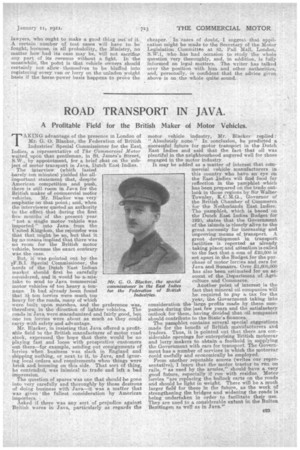ROAD TRANSPORT IN JAVA.
Page 21

If you've noticed an error in this article please click here to report it so we can fix it.
A Profitable Field for the British Maker of Motor Vehicles.
TAKING advantage of the presence in London of Mr. G. -0. Blacker, the Federation of British Industries' Special Commissioner for the East Indies, .a representative of The Commercial Motor waited upon that gentleman, in Bt. James's Street, S.W. by appointment, for a brief chat on the subject Cif motor transport in Java, Dutch East Indies.
The interview (whieh lasted barely,ten minutes) yielded the all important statement that, despite American competition and push, there is still room in Java for the British maker of commercial motbr vehicles. Mr. .Blacker was very emphatic on that point ; and, when the interviewer quoted an authority to the effect that during the first five-months of the present year "not a single motor vehicle was imported" into Java from the United Kingdorie, the rejoinder was that that might be so, but that it by no means implied that there was no room for the British motor vehicle, because the exact contrary was the case.
But, if was pointed out by the tF.B.I. Special Commissioner, the needs of the Dutch East Indian market should first be carefully considered, and it would be a-mistake to send to Java, commercial motor vehicles of too heavy a tonnage. It had already been found that 3 ton lorries were much too heavy Tor the roads, many of which were built upon marshes, and the preference was, therefore) in the direction of lighter vehicles. The roads in. Java were macadamized and fairly good, but one ton lorries were about as much as they cOuld carry with safety and advantage.
Mr. Blacker, in insisting that Java offered a profitable field to the British manufacturer of motor road stock, expressed the hope that there would be no playing fast and loose with prospective customers out there—fer example, sending out consignments of lorries when business was slack in England and shipping nothing, or next to it, to Java, and ignoring local orders and requirements when things were brisk and booming on this side. That sort of thing, he contended, was inimical to trade and left a bad impression. The question of spares was one that should be gone into very carefully and thoroughly by those desirous of doing business with Java—it was a matter that was given the fullest consideration by American importers. . Asked if there was any sort of prejudice against British wares in Java, particularly as regards the ,
motor vehicle industry, Mr. Blacker replied: ".Absolutely none." In conclusion, he predicted a successful future for motor transport in the Dutch East Indies and said that the fact that oil was plentiful in the neighbourhood augured well for those engaged in the motor industry It may be added as a matter of interest that commercial vehicle manufacturers in this country who have an eye on the East Indies will find food for reflection in the pamphlet which has been prepared on the trade outlook in those regions by Sir Walter Townley? K.C.M.G., Governor of the British Chamber of Commerce for the Netherlands East Indies. The pamphlet, which is based on the Dutch East Indies Budget for -1920, states that the Government of the islands is clearly alive to the
great necessity for increasing and improving means of transport. A great development in transport facilities is reported as already taking place; and attention is called -to the fact that a sum of 220,000 is' set apart in the Budget for the purchase of motor lorries and cars for Java and Sumatra. Over 21,000,000 has also been estimated for on account of the Department of Agriculture and Commerce. .
Another point of interest is. the fact that mineral oil companies will be required to pay a tax for the year, the Government taking into consideration the large profits made by these companies during the last few years and the satisfactory outlook for them, having decided that oil companies should contribute to the State's finances. The pamphlet contains several special suggestions made for the benefit of British manufacturers and traders. Thus, it is pointed out that there are considerable openings for enterprising British Motorcar and lorry makers to obtain a foothold in supplying the Government with cars for transport. The Government has a number of services in which the motorcar could usefully and economically be employed. From another reputable source (writes our representative), I learn that the motor tractor to run on rails, " as used by the armies," should have a very od future, especially if run with residue. Motor orries "are replacing the bullock carts on the roads and should be light in weight. There will be a much larger field for these in the future, as the work of strengthening the bridges and widening the roads is being undertaken in order to facilitate their use. They are used to a considerable extent in the Buiten Bezitingen as well as in Java."
































